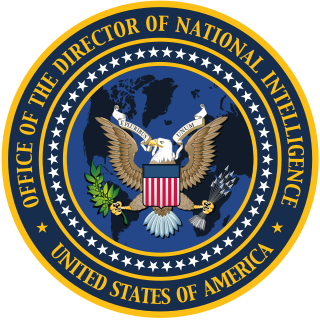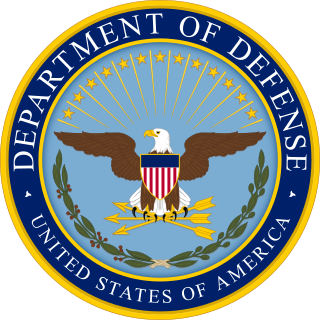
The United States National Security Council (NSC) is the principal forum used by the president of the United States for consideration of national security, military, and foreign policy matters. Based in the White House, it is part of the Executive Office of the President of the United States, and composed of senior national security advisors and Cabinet officials.

The Joint Chiefs of Staff (JCS) is the body of the most senior uniformed leaders within the United States Department of Defense, which advises the president of the United States, the secretary of defense, the Homeland Security Council and the National Security Council on military matters. The composition of the Joint Chiefs of Staff is defined by statute and consists of a chairman (CJCS), a vice chairman (VJCS), the chiefs of the Army, Marine Corps, Navy, Air Force, Space Force, and the chief of the National Guard Bureau. Each of the individual service chiefs, outside their JCS obligations, works directly under the secretaries of their respective military departments, e.g. the secretary of the Army, the secretary of the Navy, and the secretary of the Air Force.

The chairman of the Joint Chiefs of Staff (CJCS) is the presiding officer of the Joint Chiefs of Staff (JCS). The chairman is the highest-ranking and most senior military officer in the United States Armed Forces and the principal military advisor to the president, the National Security Council, the Homeland Security Council, and the secretary of defense. While the chairman of the Joint Chiefs of Staff outranks all other commissioned officers, the chairman is prohibited by law from having operational command authority over the armed forces; however, the chairman assists the president and the secretary of defense in exercising their command functions.

The director of national intelligence (DNI) is a senior cabinet-level United States government official, required by the Intelligence Reform and Terrorism Prevention Act of 2004 to serve as executive head of the United States Intelligence Community (IC) and to direct and oversee the National Intelligence Program (NIP). All IC agencies report directly to the DNI. The DNI also serves, upon invitation, as an advisor to the president of the United States, the National Security Council, and the Homeland Security Council on all intelligence matters. The DNI, supported by the Office of the Director of National Intelligence (ODNI), produces the President's Daily Brief (PDB), a classified document including intelligence from all IC agencies, handed each morning to the president of the United States.

J. Michael "Mike" McConnell is a former vice admiral in the United States Navy. He served as Director of the National Security Agency from 1992 to 1996 and as the United States Director of National Intelligence from February 2007 to January 2009 during the Bush administration and first week of the Obama administration. As of January 2024, he is the Vice Chairman at Booz Allen Hamilton.

The United States Intelligence Community (IC) is a group of separate U.S. federal government intelligence agencies and subordinate organizations that work both separately and collectively to conduct intelligence activities which support the foreign policy and national security interests of the United States. Member organizations of the IC include intelligence agencies, military intelligence, and civilian intelligence and analysis offices within federal executive departments.

The Bureau of Intelligence and Research (INR) is an intelligence agency in the United States Department of State. Its central mission is to provide all-source intelligence and analysis in support of U.S. diplomacy and foreign policy. INR is the oldest civilian element of the U.S. Intelligence Community and among the smallest, with roughly 300 personnel. Though lacking the resources and technology of other U.S. intelligence agencies, it is "one of the most highly regarded" for the quality of its work.

The Intelligence Reform and Terrorism Prevention Act of 2004 (IRTPA) is a 235-page Act of Congress, signed by President George W. Bush, that broadly affects United States federal terrorism laws. The act comprises several separate titles with varying subject issues. It was enacted in response to the terror attacks of September 11, 2001.

The United States under secretary of defense for policy (USDP) is a high level civilian official in the United States Department of Defense. The under secretary of defense for policy is the principal staff assistant and adviser to both the secretary of defense and the deputy secretary of defense for all matters concerning the formation of national security and defense policy.
The Australian Intelligence Community (AIC) and the National Intelligence Community (NIC) or National Security Community of the Australian Government are the collectives of statutory intelligence agencies, policy departments, and other government agencies concerned with protecting and advancing the national security and national interests of the Commonwealth of Australia. The intelligence and security agencies of the Australian Government have evolved since the Second World War and the Cold War and saw transformation and expansion during the Global War on Terrorism with military deployments in Afghanistan, Iraq and against ISIS in Syria. Key international and national security issues for the Australian Intelligence Community include terrorism and violent extremism, cybersecurity, transnational crime, the rise of China, and Pacific regional security.
The National Intelligence Board (NIB), formerly the National Foreign Intelligence Board and before that the United States Intelligence Board is a body of senior U.S. Intelligence Community leaders currently led by the Director of National Intelligence (DNI). The Board is tasked with reviewing and approving National Intelligence Estimates (NIEs).

The under secretary of defense for intelligence and security or USD(I&S) is a high-ranking civilian position in the Office of the Secretary of Defense (OSD) within the U.S. Department of Defense (DoD) that acts as the principal civilian advisor and deputy to the secretary of defense (SecDef) and deputy secretary of defense (DepSecDef) on matters relating to military intelligence and security. The under secretary is appointed as a civilian by the president and confirmed by the Senate to serve at the pleasure of the president.

The United States Department of Defense is an executive branch department of the federal government of the United States charged with coordinating and supervising all agencies and functions of the U.S. government directly related to national security and the United States Armed Forces. As of November 2022, the U.S. Department of Defense is the second largest employer in the world—After India; and potentially China, if including the Central Military Commission. With over 1.4 million active-duty service personnel, including soldiers, marines, sailors, airmen, and guardians. The Department of Defense also maintains over 778,000 National Guard and reservists, and over 747,000 civilians bringing the total to over 2.91 million employees. Headquartered at the Pentagon in Arlington County, Virginia, just outside Washington, D.C., the Department of Defense's stated mission is "to provide the military forces needed to deter war and ensure our nation's security".

The United States government's Information Sharing and Customer Outreach office or ISCO was one of five directorates within the office of the chief information officer (CIO) under the Office of the Director of National Intelligence (ODNI). ISCO changed its name and function to Information Technology Policy, Plans, and Requirements (ITPR) in July 2007. Established by at least February 2006, ISCO is led by the Deputy Associate Director of National Intelligence for Information Sharing and Customer Outreach, which is currently Mr. Richard A. Russell. ISCO's information sharing and customer outreach responsibilities extend beyond the United States Intelligence Community and cross the entire U.S. government.

The National Science and Technology Council (NSTC) is a council in the Executive Branch of the United States. It is designed to coordinate science and technology policy across the branches of federal government.
Executive oversight of United States covert operations has been carried out by a series of sub-committees of the National Security Council (NSC).
United States Intelligence Community Oversight duties are shared by both the executive and legislative branches of the government. Oversight, in this case, is the supervision of intelligence agencies, and making them accountable for their actions. Generally oversight bodies look at the following general issues: following policymaker needs, the quality of analysis, operations, and legality of actions.
The Boren-McCurdy intelligence reform proposals were two legislative proposals from Senator David Boren and Representative Dave McCurdy in 1992. Both pieces of legislation proposed the creation of a National Intelligence Director. Neither bill passed into law.

The Intelligence Authorization Act for Fiscal Year 2014 is a U.S. public law that authorizes appropriations for fiscal year 2014 for intelligence activities of the U.S. government. The law authorizes there to be funding for intelligence agencies such as the Central Intelligence Agency or the National Security Agency, but a separate appropriations bill would also have to pass in order for those agencies to receive any money.

The National Intelligence Coordination Committee (NICC) is a peak intergovernmental officials-level body of the Government of Australia responsible for the development and co-ordination of the Australian Intelligence Community in accordance with the National Security Committee of Cabinet. The NICC is chaired by the Director-General of the Office of National Intelligence.